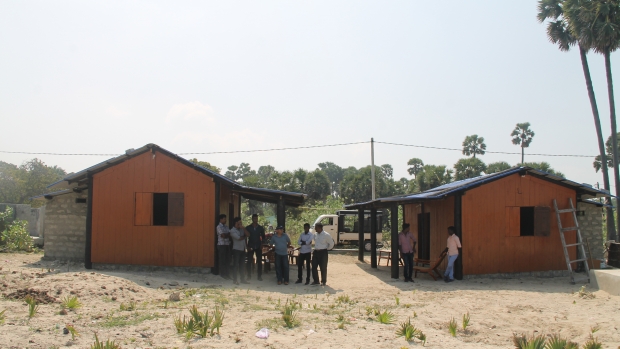Grants :: Small Grant Facilities :: Phase 3 SGF Projects LK :: Building economic resilience of returned coastal communities through sustainable management of ecosystems
Building economic resilience of returned coastal communities through sustainable management of ecosystems

The two cabanas (view from the beach), Delft Island © Kumudini EKARATNE
Objectives
Ecotourism introduced as a livelihood for fishing communities
Background
Through the two and half decades of the civil war conflict, Delft Island was drastically affected with population displacement and had been a focal point for the bases of the security forces.
The returnees’ communities are extremely vulnerable as they don’t have enough economic resilience due to the island isolation: they remain socially and economically vulnerable to this date.
The options of fisheries and agriculture livelihoods remain limited with limited fisheries equipment that allow the fishermen to fish mostly in shallow water.
Though there are abundance of shell fish, the fishermen don’t have access to markets and depend of the fisheries society monopoly who don’t pay them at a fair price.
On the other hand, the agriculture sector is affected by the water scarcity.
Target beneficiaries
The project aims to increase the income and create new livelihoods for the communities in the J3 ward of Delft Island and will specifically benefit the inhabitants of the Ward 6, 7, 8 of this GN Divisions.
Outputs
- Two eco-friendly beach cabanas built and the surrounding garden implemented with 50 coastal plants
- Training of the community members in hospitality
Accomplishments and challenges
Accomplishments:
- Two cabanas with landscaped garden
- 350 copies of leaflets and 300 number of tour maps were designed, printed and distributed to hotels and public institutions
- Cabana team members (six from the community) trained in hospitality: housekeeping, towel art etc…
- Six community members and 1 representative from Sevalanka Foundation trained in management and operations such as developing leadership qualities, making booking, handling complaints and improving the knowledge and practice in book keeping.
Challenges:
The unusual rain pattern and two mini cyclones caused serious delays in the construction of the cabanas.
Contributions to cross-cutting themes
Gender integration:
Five of the six cabanas team members are women.
Communication:
The project has not spelt out a strategy for communications. Although, leaflet on cabana facilities and a tour map depicting tourist attractions on Delft Island have been printed and distributed.
Lessons Learned
Projects with construction activities as the main component should be avoided during rainy seasons, in order to prevent any delays.
Project Facts
Country
Location
Delft Island
Topic
Duration
15th Aug 2016 to 15th Feb 2017
Implementing Partner
Sevalanka Foundation
Ms.Lakshi Abeyasekera
Tel: +94 11 2545362
Mobile: +94 777576693
lakshi@sevalanka.org